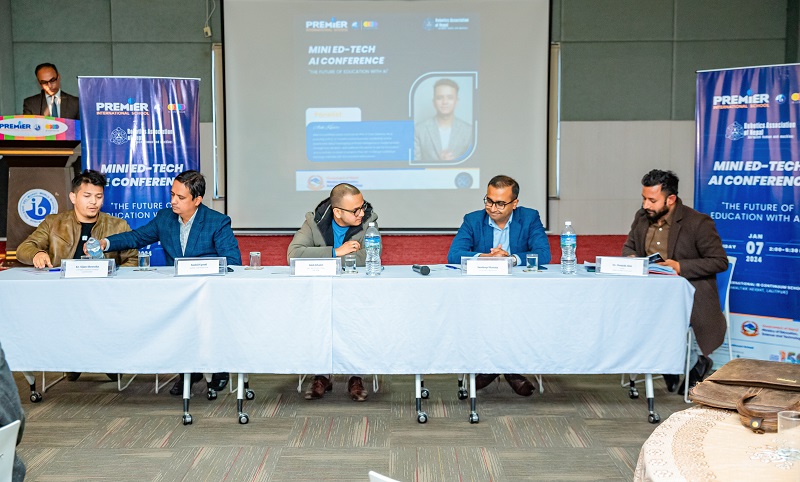Mini EdTech AI Conference 2024 Setting Plans for AI Policy Development
11th January 2024, Kathmandu
Mini EdTech AI Conference 2024 concludes setting plans for AI Policy development and AI Conference for Prosperous Nepal
Premier International IB Continuum School, Robotics Association of Nepal, and Ministry of Education, Science and Technology are thrilled to announce the completion of the Mini EdTech AI Conference 2024 with the theme “Future of Education with AI” which is a pre-event leading to Robotics, and AI Conference – AI for Prosperous Nepal, a part of YANTRA – Science, Technology, and Entrepreneurship festival happening this February 16, 2024. This conference brought together 50+ educators, technologists, and AI practitioners onto one platform to explore the intersection of education, technology, and artificial intelligence at Premier International IB Continuum premises, Khumaltar, on 7th January 2024.
In her opening remarks Pravina Thapa, Academic Director, of Premier International IB Continuum School emphasized how leveraging AI presents the government and other ecosystem players with a unique opportunity to spread high-quality education, adaptive content, and personalized support ensuring that quality education is accessible to all regardless of geographic location. Er. Bikash, President, of the Robotics Association of Nepal highlighted RAN’s mission of creating a Robotics Industry in Nepal by 2030 and how events such as the Mini Edtech AI Conference will be counted as a milestone in the mission as these support the growing ecosystem around AI for Education.
Mr. Indu Bikram Joshi, Joint Secretary, MoEST, and the Keynote Speaker of the event shared the government’s strong commitment to advancing AI in education, leveraging his extensive policy drafting experience. Joshi hailed this conference as a foundational step for future collaborations in AI and education, positioning Nepal positively on the global AI landscape. He also outlined ongoing efforts to develop a comprehensive AI strategy, emphasizing the government’s vital role in funding, regulation, human resource development, and infrastructure building for AI entrepreneurship in the country.
Speakers such as Mr. Rishav Raj delved into the latest AI toolkits transforming the education landscape such as ChatGPT, Space Types, Quillbots, and Elicit, showcasing their functionalities. Mr. Jerry Tan, CEO, of Lattel Robotics, highlighted common AI applications such as autonomous vehicles, natural language processing, and computer vision, emphasizing their real-world impact and introducing a new approach to AI education, focusing on practical applications in four areas: computer vision, autonomous navigation, object manipulation, and speech interaction.
Mr. Punit Jajodia, Co-founder at Programiz, highlighted the significance of integrating AI mentors into coding education, discussed the challenge posed by the shrinking half-life of knowledge, and underscored the importance of continuous learning by sharing a personal experience of job displacement due to AI advancements in transcription. Mr. Kshitiz Rimal, Founder, of Next AI, shared that 2023 was the year for generative AI and gave an example of the Gemini model developed by Google which can be used for Text Generation, Image Generation, and Video Generation with high reasoning capacity.
A power-packed Panel Discussion delved into the Future of Education with AI where Mr. Sushil Upreti, Leader, of GEG Kathmandu broadened the idea of AI not limited to only ICT now but as part of society and our daily lives. Mr. Sandeep Sharma, Principal-Director at Adhyayan School, shared his school’s focus on coding as a universal language that needs to be learned by students and teachers alike. Mr. Alok Khatri, Head – Digital Innovation and Change fostered the need for AI in business school as business students cannot be treated only in this race of AI. Er. Sijan Shrestha, Senior ML Engineer at Fusemachines Nepal, spoke about Fuse Classroom which is a platform where the general public can learn about AI.
Mini EdTech AI Conference
He also shared how the AI fellowship program at Fusemachines helps to fill the gap between school-level courses and industrial requirements. Dr. Nastaran Zadeh, President, of the Mechatronics and Robotics Society of the Philippines highlighted the need to focus on training the trainer to prepare for the wave of AI. Er. Deepak Bist, Panel Moderator, closed the discussion by summarizing that we should not lose the essence of being human and human learning capabilities with the evolution of AI. In the Q&A session, Pawitra Limbu, School Director at Premier International IB Continuum School, raised an essential question of how children can be nurtured to learn values and empathy which makes humans unique in an increasingly machine-dominated world.
Dr. Rabindra Pd. Dhakal, Secretary, NAST shared his commitment to support the transformation journey with AI in education through rigorous training for Science and ICT teachers at the school and university level. Er. Santosh Sharma, Under Secretary (Technical) at MoEST, concluded the conference by committing that MoEST is ready to work together with the private sector to develop relevant AI frameworks and policies and highlight how such conferences can help build a working document to aid policy-making.







